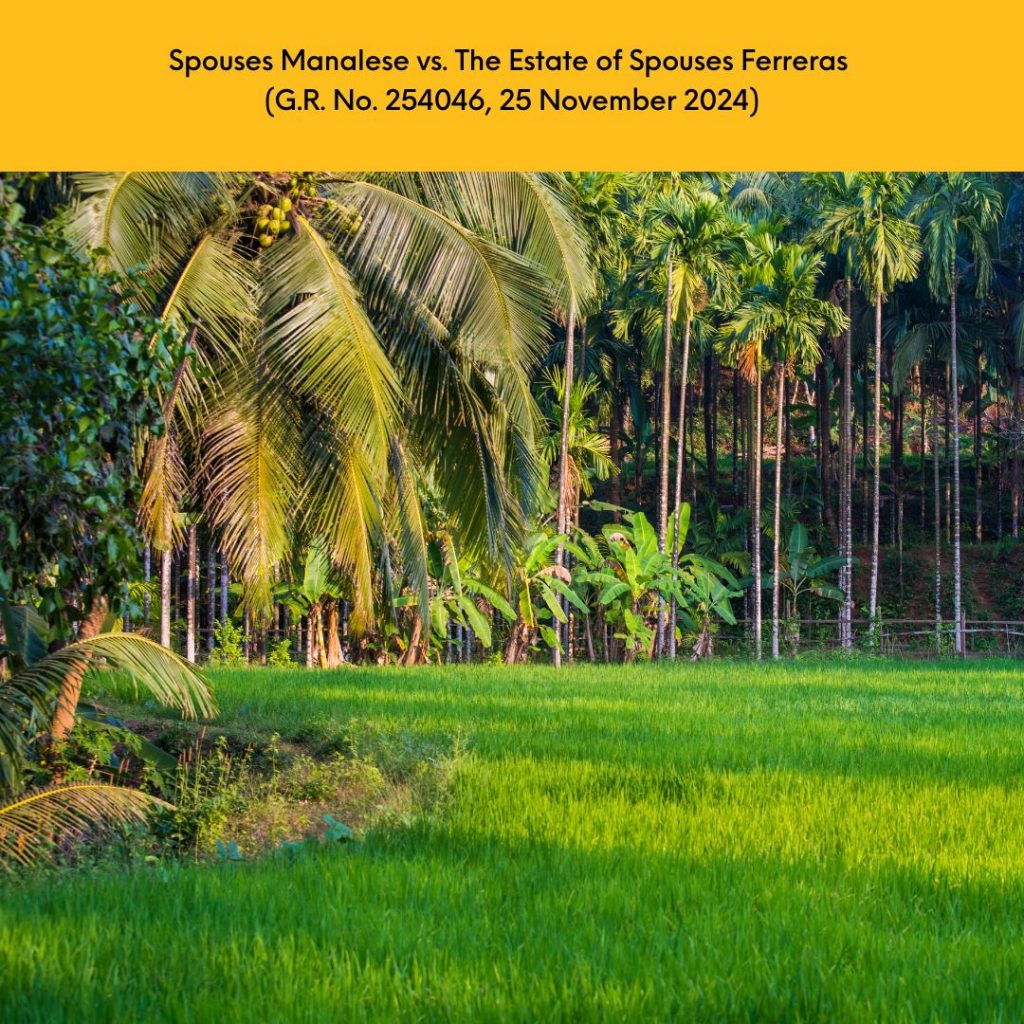
Published 12 May 2025, The Daily Tribune
It is common practice for buyers of real property to rely solely on the certificate of title to verify ownership. This approach is supported by jurisprudence under the “curtain” and “mirror” doctrines. The “curtain” doctrine asserts that a buyer need not look beyond the certificate, which contains all relevant information on ownership (Spouses Cusi v. Domingo, G.R. Nos. 195825 & 195871, 27 February 2013). The “mirror” doctrine reinforces this, holding that buyers may safely rely on the title’s accuracy without investigating further (Chua v. Republic, G.R. No. 253305, 2 August 2023).
Yet the Supreme Court, in Spouses Manalese v. Estate of the Late Spouses Ferreras (G.R. No. 254046, 25 November 2024), sounded a cautionary note: buyers must go beyond the title and examine the records of the Registry of Deeds. Failure to do so could expose them to fraudulent transactions.
In this case, the Manaleses purchased two parcels of land in 2010 from Carina Pinpin, who appeared to be the registered owner. She claimed to have acquired the properties a year earlier from the original owners, the spouses Ferreras. The titles were in Pinpin’s name, the price was paid, and new certificates of title were issued in favor of the Manaleses. However, the estate of the Ferreras spouses alleged that the titles were obtained through fraud: Pinpin had filed a false affidavit of loss and used a forged deed of sale. In fact, the spouses Ferreras had long since passed away.
The estate sought the annulment of the titles. The Manaleses defended themselves as innocent buyers who had relied in good faith on clean titles. But the Court disagreed, affirming the findings of both the trial court and the Court of Appeals. It ruled that no legal rights can arise from a forged document. The 2009 deed of sale—purportedly signed by the deceased Ferreras spouses—was null and void. Consequently, Pinpin’s titles, and those issued to the Manaleses, were likewise void.
Critically, the Court found that the Manaleses had failed to exercise due diligence. They relied exclusively on Pinpin’s titles despite glaring red flags: a suspiciously low purchase price, an unreasonably compressed timeline of transfers, and a lack of physical inspection or document verification. The Court emphasized that a prudent buyer must investigate beyond the title—reviewing the property’s history, examining supporting documents, and checking with the Registry of Deeds.
While the Torrens system aims to ensure certainty in land ownership, its protection does not extend to those who are negligent or willfully blind. The Court drew a firm line between good faith and blind reliance. A buyer who notices red flags but fails to inquire further cannot invoke the defense of good faith.
The ruling underscores an important legal principle: a person dealing with registered land is deemed to have constructive notice of all entries in the Registry of Deeds. In this case, the Registry contained several crucial entries, including Pinpin’s affidavit of loss, the issuance of new duplicate titles, a second affidavit filed by the Ferreras estate, and the near-simultaneous registration of these annotations. All were red flags that a diligent buyer would have uncovered.
This decision is a stark reminder that while a certificate of title offers strong presumptive proof of ownership, it is not conclusive in the face of fraud. Titles procured through forgery are void, regardless of the time elapsed or the number of times the property has changed hands. Buyers must therefore perform double due diligence—checking both the face of the title and the underlying records—to safeguard their interests.
For more of Dean Nilo Divina’s legal tidbits, please visit www.divinalaw.com. For comments and questions, please send an email to cad@divinalaw.com.

